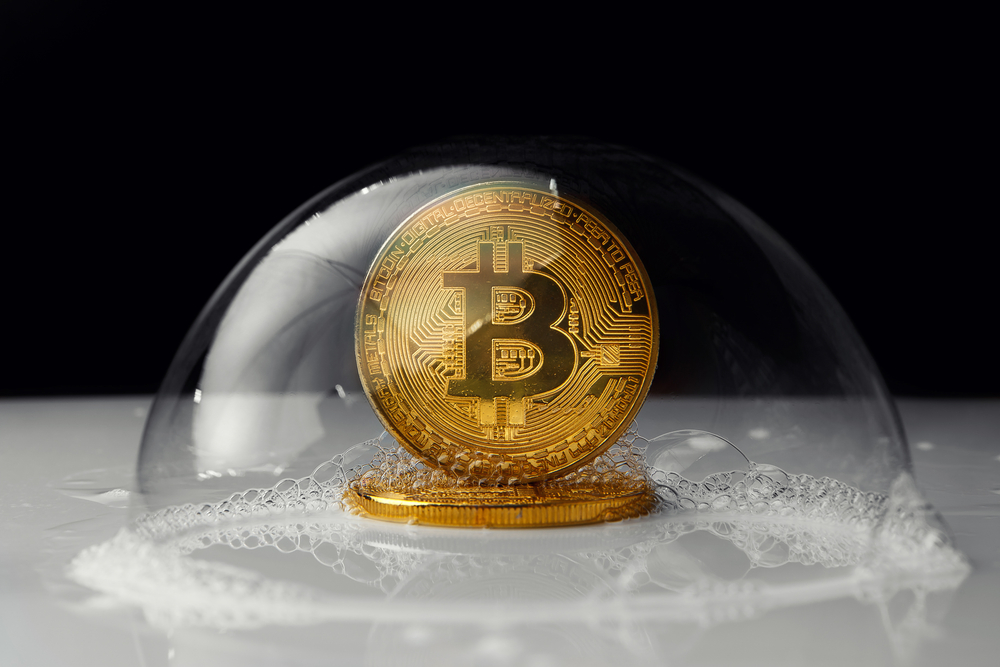Wait a minute, when has there ever been a currency bubble?

If you've scanned the crypto news in recent weeks, you will have noticed a smattering of stories suggesting that the whole cryptocurrency market, is a bubble. Such news is not exactly new. Since the spring, the crypto market has multiplied in value by a factor of six and the word "bubble" has thus inveigled its way into commentators conversations.
A few days ago, the Wolf of Wall St, Jordan Belfort, joined JP Morgan CEO, Jamie Dimon in declaring Bitcoin to be both a fraud and a bubble. Jordan can, at least, legitimately claim expertise in fraud having pleaded guilty to that very crime and served 22 months in prison for it. However, he’s wrong on both points.
SEE ALSO: Bitcoin breaks over $5,200: You expected that, right?
I’m Forever Blowing Bubbles
Before the bubble talk gets completely out of hand, it is worth defining what a bubble actually is. History’s most celebrated examples are: The Dutch Tulip mania (1637), the British South Sea Bubble (1720), the US stock-market bubble (1929), the US dot-com bubble (2000) and the US housing bubble (2007).
To understand what financial bubbles are, it helps to know that they have well-defined stages. They are as follows:
- Opportunity: It begins with a relatively small group of investors and speculators discovering an opportune asset that they buy into. It could be anything, but most often it is something disruptive that is a departure from the staid investments of the day, particularly a new technology.
- Dramatic Profits: The investment asset begins to produce dramatic profits providing the foundation for a bubble. This provokes a flurry of attention in the financial media and then in mainstream media. Risk-tolerant investors get involved and the dramatic profits escalate. If cryptocurrencies are to become a bubble, then right now they are, in my opinion, at this stage of the bubble. However, what the new exciting market is missing in this stage is the brokers in the financial market promoting the new investment asset and recommending investors to get involved.
- FOMO (Fear Of Missing Out): In this stage, the normal investor has the ability to get involved and many become envious of the sharper investors (friends and associates) who have made dramatic profits. So they pile in and the price of the asset begins to shoot up like a rocket. The new asset class appears to be the only game in town and everyone wants to play. This is the point when the price of the asset escalates far beyond any fundamental value that could be justified by sober analysis. The price in stage 2 might have been realistic, but in this stage, speculative demand is the only factor that is pushing the price higher.
- The Peak: During the peak stage the wiser investors start taking profits, selling to the laggards who are still desperate to pour their money into the market. The smart money is leaving the market as the stupid money is entering it. Eventually, the sellers begin to outnumber the buyers. At this stage of a bubble, you often come across news stories which insist that the market cannot fall and the price will continue to fly higher. There may even be some who suggest that the price will keep on rising forever. Just before the Wall St Crash of 1929, Yale economist Irving Fisher proclaimed, in the pages of the New York Times, "Stock prices have reached what looks like a permanently high plateau." Even reputable economists get caught up in the euphoria.
- The Panic: The price of the asset collapses and does so very quickly. So much money has been plowed into the asset, many people have been borrowing to buy, that this collapse in value may infect the whole economy and lead to a deflationary collapse where the price of all assets fall below their fundamental value and the most valuable thing to hold is the currency itself -- possibly under your mattress -- as the banks themselves may be collapsing. The price of the glittering new investment asset may even fall to zero.
Is A Crypto Bubble Bubbling Up?
The market capitalization of the crypto market is a little below $150 billion. The current market cap of the New York Stock Exchange (NYSE) is more than 100 times greater, in the region of $18 trillion. If the value of the crypto market collapsed to zero, which is unlikely in the extreme, it would have less economic impact in the US than a drop of 1 percent in the NYSE, which is a disappointing day for the market, but is not so uncommon and never causes more than a shrug of the shoulders.
Right now there is no crypto bubble, and it is possible that there will never be one. There are other exciting investments out there right now such as the IoT and Big Data /AI. They are not bubbles yet either.
Nevertheless, if the crypto market moves into the FOMO stage, and it may, a bubble may start to form. For that to happen, the hedge funds and the big Wall St investment money would need to enter the market -- and since the crypto market is international -- so would similar investment pools from other geographies. If and when that happens, we still haven’t arrived at the point where Joe Public throws his hat into the ring.
Are Currency Bubbles Possible?
Real currencies do not form bubbles. Certainly, when a currency becomes debased, from money printing (it’s always money printing), the holders of that currency quickly dump it if they can. There are many historical examples of that -- the most recent one being provided by Zimbabwe. But the holders of such currencies were not investors, they held the currency for the sake of day-to-day usage. And when those who dump their holdings do so, it is for a more reliable currency (in recent years, the Dollar).
With Bitcoin, you have the unusual situation of the currency being used both as an investment and for transactions. As Bitcoin and most other crypto currencies cannot be debased, their value will not collapse for that reason. However, Bitcoin could collapse from speculative excess. And it may do in the future. But it will not happen until after the FOMO stage. Typically that takes a few years to play out. And it may not happen at all.
Photo Credit: Parilov/ Shutterstock
 Prior to joining Algebraix Data, Robin Bloor was a leading advocate for data algebra. He is now Senior VP of Strategy and Communications and part of the team that is working on Algebraix Data’s blockchain project. He has more than 30 years of experience in the world of big data and information management, and is an influential and respected researcher and commentator on many corporate IT issues and strategies. Robin is the founder of Bloor Research, an IT analyst company based in the UK and cofounder of the US analyst company, The Bloor Group.
Prior to joining Algebraix Data, Robin Bloor was a leading advocate for data algebra. He is now Senior VP of Strategy and Communications and part of the team that is working on Algebraix Data’s blockchain project. He has more than 30 years of experience in the world of big data and information management, and is an influential and respected researcher and commentator on many corporate IT issues and strategies. Robin is the founder of Bloor Research, an IT analyst company based in the UK and cofounder of the US analyst company, The Bloor Group.